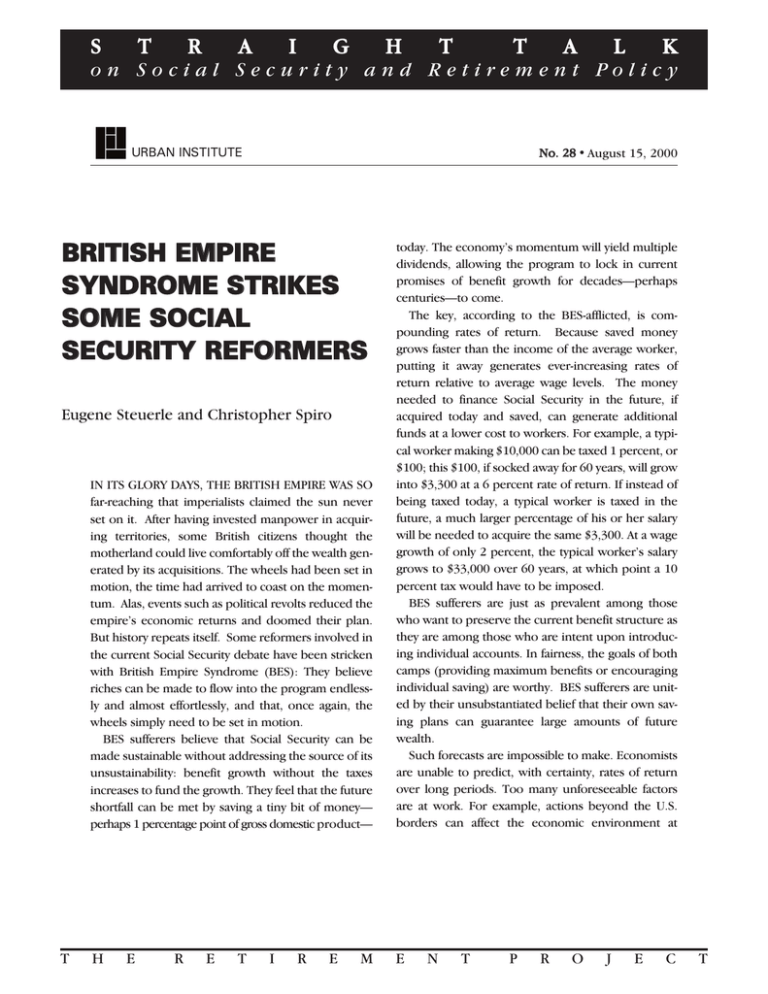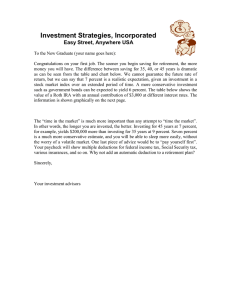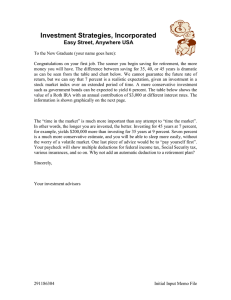B BR RIIT TIIS
advertisement

S T R A I G H T T A L K on Social Security and Retirement Polic y URBAN INSTITUTE No. 28 August 15, 2000 ● IN ITS GLORY DAYS, THE BRITISH EMPIRE WAS SO far-reaching that imperialists claimed the sun never set on it. After having invested manpower in acquiring territories, some British citizens thought the motherland could live comfortably off the wealth generated by its acquisitions. The wheels had been set in motion, the time had arrived to coast on the momentum. Alas, events such as political revolts reduced the empire’s economic returns and doomed their plan. But history repeats itself. Some reformers involved in the current Social Security debate have been stricken with British Empire Syndrome (BES): They believe riches can be made to flow into the program endlessly and almost effortlessly, and that, once again, the wheels simply need to be set in motion. BES sufferers believe that Social Security can be made sustainable without addressing the source of its unsustainability: benefit growth without the taxes increases to fund the growth. They feel that the future shortfall can be met by saving a tiny bit of money— perhaps 1 percentage point of gross domestic product— today. The economy’s momentum will yield multiple dividends, allowing the program to lock in current promises of benefit growth for decades—perhaps centuries—to come. The key, according to the BES-afflicted, is compounding rates of return. Because saved money grows faster than the income of the average worker, putting it away generates ever-increasing rates of return relative to average wage levels. The money needed to finance Social Security in the future, if acquired today and saved, can generate additional funds at a lower cost to workers. For example, a typical worker making $10,000 can be taxed 1 percent, or $100; this $100, if socked away for 60 years, will grow into $3,300 at a 6 percent rate of return. If instead of being taxed today, a typical worker is taxed in the future, a much larger percentage of his or her salary will be needed to acquire the same $3,300. At a wage growth of only 2 percent, the typical worker’s salary grows to $33,000 over 60 years, at which point a 10 percent tax would have to be imposed. BES sufferers are just as prevalent among those who want to preserve the current benefit structure as they are among those who are intent upon introducing individual accounts. In fairness, the goals of both camps (providing maximum benefits or encouraging individual saving) are worthy. BES sufferers are united by their unsubstantiated belief that their own saving plans can guarantee large amounts of future wealth. Such forecasts are impossible to make. Economists are unable to predict, with certainty, rates of return over long periods. Too many unforeseeable factors are at work. For example, actions beyond the U.S. borders can affect the economic environment at H E BRITISH EMPIRE SYNDROME STRIKES SOME SOCIAL SECURITY REFORMERS Eugene Steuerle and Christopher Spiro T E R E T I R E M N T P R O J E C T S T R A I G H T T A L K on Social Security and Retirement Polic y Members of Congress who have ventured to speak this truth have been labeled part of the “pain caucus.” Surprisingly, these policymakers are not opposed to taking the steps suggested by the BES proponents. Even members of this so-called caucus recognize the benefits of acquiring additional money and placing it today in private or public savings: Such saving may help to meet future benefit demands. However, these policymakers see the danger of guaranteeing benefits when so little certainty exists about the future of the program’s financial well-being. Ultimately, promising only that which can be delivered with a fair degree of certainty may be the least painful alternative of all. home; worldwide rates of return can easily fall if other countries begin to save for their own Social Security systems, making capital less scarce. Other events further complicate this scenario. The current aging of the world population and the retirement of vast proportions of adults is a phenomenon without precedent, making precise financial forecasting, including accurate predictions of returns from saving, unfeasible. This unpredictability also exists on a more personal scale. No one knows how people will ultimately react to more deposits being made either in individual accounts or in the Social Security trust funds. For example, individuals may be inspired to cut back on the amount they contribute to their private pensions; similarly, the increased supply of gross saving in one part of the economy may simply induce individuals to borrow more money for consumption. Either reaction is counterproductive, making it harder to reach the desired result of increasing societal saving so that promised benefit growth can be guaranteed for decades or centuries to come. BES is a convenient affliction. It allows policymakers to promise benefit growth without having to present difficult choices. Addressing Social Security’s financial imbalance will require at least one of the following: a slower rate of promised benefit growth, higher taxes, reduced spending on education and other programs, or more work. Money to meet the shortfall must come from somewhere. This is the truth, as politically unpopular as it may be. T H E R E T I R E Eugene Steuerle is a senior fellow at the Urban Institute, where his research includes work on Social Security reform. Christopher Spiro is a research assistant at the Urban Institute. This series is made possible by an Andrew W. Mellon Foundation grant. For more information, call Public Affairs: 202-261-5709. For additional copies of this publication, call 202-261-5687 or visit the Retirement Project’s Web site: http://www.urban.org/retirement. Copyright ©2000. The views expressed are those of the authors and do not necessarily reflect those of the Urban Institute, its sponsors, or its trustees. Permission is granted for reproduction of this document, with attribution to the Urban Institute. M E N T P R O J E C T




